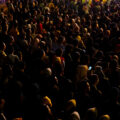Does the digitalisation of religion make us individualists or collectivists?
Does the digitalisation of religion make us
individualists or collectivists?
Contemporary Europe has been undergoing revivals and renewals of both individual and collective religious life. These transformations have been caused by social, political and economic changes, and also by significant shifts within religious thought and tradition itself. Digitalisation has also played an important role. The COVID-19 pandemic has both intensified and diffused these revivals and renewals, with a distinct departure from the past: digitalisation in many ways is now playing the defining role in determining these and is even offering these new meaning.
This article was written in preparation for our round table on digital religion. Please find the full white paper here.
Digitalisation: making individualism possible in religion
The digital transformation of religion in Europe has made it possible for individual life to exist on its own within religion. Experiences that favour freedom of action for individuals are now more accepted as a true part of religion. The recent rise of ‘app faith’ across the world, and indeed Europe, for example, has seen believers embrace digital technology to readily transform collective experiences into individual ones: in Ghana, the Muslim call to prayer normally made by mosques is now also sent out on WhatsApp; in the UK, funerals are now broadcast online, with rabbis and vicars routinely officiating at live-streamed services; and in the US, televangelists deliver digital devotional messages and sermons daily, and also make donations easy through ‘give’ features.[1] Beyond making religion ‘easy’, this digitalisation has also made religion more inclusive for believers who have characteristically been more individualistic, such as millennials. ‘OneTable’ is a compelling example. The app encourages young Jewish millennials in the US to celebrate the Shabbat every week online. While the Friday night dinners of the Shabbat are a religious practice for many, the weekly OneTable dinners are a way for the millennials to engage with their Jewish identities and protect the Shabbat for future generations.[2]
With the COVID-19 pandemic in Europe, the space for individual experiences – whether helped by digital technology or not – has not only grown rapidly but also gained unprecedented legitimacy. During the lockdown, Muslims replaced mass prayer with individual prayer. Calling the pandemic a time for solidarity, the Chairman of the French Board of Imams, Hocine Drouiche, supported the decisions to close the Grand Mosque of Paris and Mecca and Medina and criticised opposition to the closure of mosques.[3] Equally significant shifts took place in Catholic Europe. Pope Francis in Italy allowed individual confessions without the mediation of a priest. The faithful now confess directly to God.[4]
Digitalisation: renewing collectivism in Europe
The COVID-19 pandemic has also revealed how digitalisation has allowed the rise of new forms of collectivism within religion. Social distancing measures to stop the spread of COVID-19 have meant that religious communities around Europe and the world cannot celebrate religious festivals as before. For instance, Jewish people cannot traditionally celebrate Passover. During Easter and Ramadan, Christians and Muslims also faced the same dilemma. Believers were still able to prioritise these collective experiences during the lockdown by using digital technologies to overcome physical separation from each other and their places of worship and celebration.
In Europe, much like the rest of the world[5], many religious communities have gone online on Zoom. Jews hosted virtual Seder meals. Christians virtually observed Good Friday. Muslims ran virtual Iftars. The move to digital experiences has in fact led to an increase in attendance at worship services during the pandemic. For instance, the Anglican Palm Sunday mass at Plymouth Cathedral, which usually draws 650 worshippers, attracted 2,200 people to tune into this year’s online service.
Digitalisation: reviving collective practices
The COVID-19 pandemic has in many ways also revealed the limits of how far digitalisation can keep up with real-life religious experiences. Many believers in Europe did not agree that digitally transformed collective experiences were valid. Orthodox Jews in France refused to celebrate Sabbath without being able to meet physically for example.[9] In places, this rejection of digital technology was even met with the revival of physical collective practices despite the lockdown. Funeral masses in Ireland, for example, have become a key practice despite COVID-19 restrictions and despite the fact that Catholicism has been declining in the country. While Ireland’s Archbishop Diarmuid Martin encouraged parishioners to embrace digital technology to live stream funeral masses, many rural dioceses refused to go online: funeral masses in fact gained new meaning in rural Ireland[10], becoming events of community resilience in the face of the pandemic challenges.
Digitalisation: new and unexpected forms
The impact of digital technologies on religious life in Europe has always been a significant question. Much like the discussions on the impact of modern life on religion, the prevailing prediction has been that because of digitalisation, religion will eventually lose its collective form. And with the loss of collective life to digitally-driven individual life, religion itself would inevitably decline in Europe. Recent digital transformations across religious communities in Europe, particularly during the COVID-19 pandemic, reveal a different and indeed unpredictable picture. Digitalisation appears to in fact be reinforcing religious collective life, by making individual life ‘essential’, either to collective experiences or to religion itself. Significantly, it has shown how religion – across its collective as well as individual forms – is essential to life in Europe itself.
Would you like to stay updated on religion and society? Visit the EARS Dashboard.






